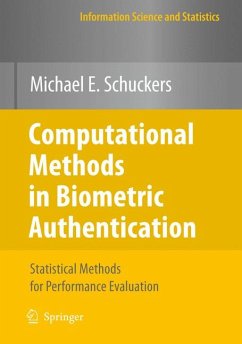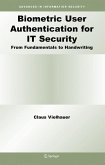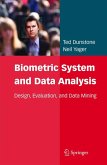Compensating for this need, this unique text/reference provides a basic statistical methodology for practitioners and testers of bioauthentication devices, supplying a set of rigorous statistical methods for evaluating biometric authentication systems. This framework of methods can be extended and generalized for a wide range of applications and tests.
This is the first single resource on statistical methods for estimation and comparison of the performance of biometric authentication systems. The book focuses on six common performance metrics: for each metric, statistical methods are derived for a single system that incorporates confidence intervals, hypothesis tests, sample size calculations, power calculations and prediction intervals. These methods are also extended to allow for the statistical comparison and evaluation of multiple systems for both independent and paired data.
Topics and features:
- Provides a statistical methodology for the most common biometric performance metrics: failure to enroll (FTE), failure to acquire (FTA), false non-match rate (FNMR), false match rate (FMR), and receiver operating characteristic (ROC) curves
- Presents methods for the comparison of two or more biometric performance metrics
- Introduces a new bootstrap methodology for FMR and ROC curve estimation
- Supplies more than 120 examples, using publicly available biometric data where possible
- Discusses the addition of prediction intervals to the bioauthentication statistical toolset
- Describes sample-size and power calculations for FTE, FTA, FNMR and FMR
Researchers, managers and decisions makers needing to compare biometric systems across a variety of metrics will find within this reference an invaluable set of statistical tools. Written for an upper-level undergraduate or master's level audience with a quantitative background, readers are also expected to have an understanding of the topics in a typical undergraduate statistics course.
Dr. Michael E. Schuckers is Associate Professor of Statistics at St. Lawrence University, Canton, NY, and a member of the Center for Identification Technology Research.
Dieser Download kann aus rechtlichen Gründen nur mit Rechnungsadresse in A, B, BG, CY, CZ, D, DK, EW, E, FIN, F, GR, HR, H, IRL, I, LT, L, LR, M, NL, PL, P, R, S, SLO, SK ausgeliefert werden.
Hinweis: Dieser Artikel kann nur an eine deutsche Lieferadresse ausgeliefert werden.









